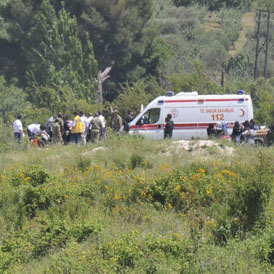Syria unrest: ‘hundreds’ flee to Turkey
As David Cameron pushes for UN action on Syria, ‘hundreds’ have fled the country to Turkey after tanks surrounded the north western town of Jisr al-Shughour.
Prime Minister David Cameron has confirmed Britain’s commitment to a draft UN resolution condemning the repression by the Syrian government.
It comes as Syrian tanks surrounded the north western town of Jisr al-Shughour near the Turkish border, prompting tens of thousands of people to flee the town.
Syrian authorities have promised “firm and forceful” action in the town after they claimed 120 troops were killed by “armed gangs” during multiple attaks.
David Cameron told the House of Commons that President Assad had lost legitimacy and that the UK and France are leading calls for reform.
“Today in New York, Britain and France will be tabling a resolution at the Security Council condemning the repression and demanding accountability and humanitarian access,” Mr Cameron told Parliament.
Syrian authorities have promised ‘firm and forceful’ action in the town of Jisr al-Shughour.
“And if anyone votes against that resolution or tries to veto it, that should be on their conscience,” he continued.
Britain, France, Germany and Portugal circulated a draft resolution condemning Syria at the UN Security Council last month, but diplomats say Britain has been working on a version with tougher language. Veto powers Russia and China have made clear they dislike the idea of council involvement.

Converging on Jisr al-Shughour
Tanks and what reports say are “thousands of elite troops” from the Syrian army’s 4th division – led by President Assad’s brother Maher al-Assad – have converged on Jisr al-Shughour.
“The army is taking up position around Jisr al-Shughour,” one anti-government activist told the Reuters news agency, saying residents had seen troops approaching the north eastern town from Aleppo, Syria’s second city, and from Latakia on the coast.
“Most people have left the town because they are scared,” he said, asking not to be named for his own safety.
“They know the deaths will be high. People have gone to nearby villages close to the Turkish border. The doctors and nurses have also left.”
Most people have left Jisr al-Shughour because they are scared. Syrian anti-government activist
Turkish Prime Minister Tayyip Erdogan promised the country would not “close its doors” to refugees fleeing unrest in Syria, after officials said 450 people had crossed the border. But other reports say far fewer have managed to leave Syria.
Nadeem Houry from Human Rights Watch informed Channel 4 News from Beirut just how difficult it was to get accurate information from the region, he said: “there are no reliable numbers right now, we know Syrians are not letting people through but we don’t know if they can control the whole border”
“Turkish authorities are not letting refugees speak to the media, so we do not yet know how these people have been treated,” he added.
Channel 4 News contacted the United Nations High Commision and Turkish Ministry of the Interior but they have so far not responded.
Fears for neighbouring villages
Amnesty International’s Neil Sammonds, who’s researched Syria for the human rights group for 8 years, told Channel 4 News his organisation had received the names of 120 civilians who had been killed in Jisr al-Shugour, and that he feared Syrian forces may also target neighbouring villages.
“The level of demonstrations has certainly got bigger, last weekend there were demonstrations at more than 200 locations, and the way protests are moving geographically is very interesting, they appeared in Deraa where they were brutally cut down, and it’s now clear that unrest has spread to the north,” he said.
“So looking at the response in places like Deraa, there’s every reason to believe that armed forces will come down hard on neighbouring villages.”
“But I think this will galvanise people in the long term, people from all over the country can see what’s happening with their own eyes. The Syrian government is conducting a media war, but they haven’t backed up their claims with footage.” Sammonds added.
‘Security service mutiny’
International media have been banned from Syria and the internet has been blocked, making it difficult to verify accounts in Jisr al-Shughour.
State television said unrest began after Friday prayers and continued over the weekend, resulting in the killing of 120 officials who were then mutilated and thrown into a river.
But eyewitnesses and activist websites say soldiers refused to fire on a mass funeral procession on Saturday. It is claimed Syrian authorities sent in a helicopter gunship to fire on the protesting soldiers.
“I think they executed policemen who refused to open fire on demonstrators. There was a mutiny in the security service,” one resident told the AFP news agency.
In February 1982 Syrian forces crushed what the state said was an armed revolt by Sunni Islamists in the city of Hama, on the orders of President Assad’s father. Up to 40,000 people were killed, the majority civilians, in an operation supervised by President Assad’s younger brother Rifaat.
According to Syrian media at the time, anti-government rebels started the conflict by attacking government troops. The security forces then “rose to confront these crimes”.
In 1980 a rebellion in Jisr al-Shughour was also brutally crushed by Hafez al-Assad.
